We have handled Search Engine Optimisation (SEO) campaigns for numerous businesses within the travel and accommodation industry, specifically focusing on holiday rentals. This guide is not your typical SEO manual; it offers real, honest answers to your pressing SEO questions.
Is SEO a cost-effective tool to use? What results can you expect? What are the best SEO practices to implement? This article answers all these questions and more.
Covering the basics of SEO
Simple Explanation Of SEO for holiday rental businesses
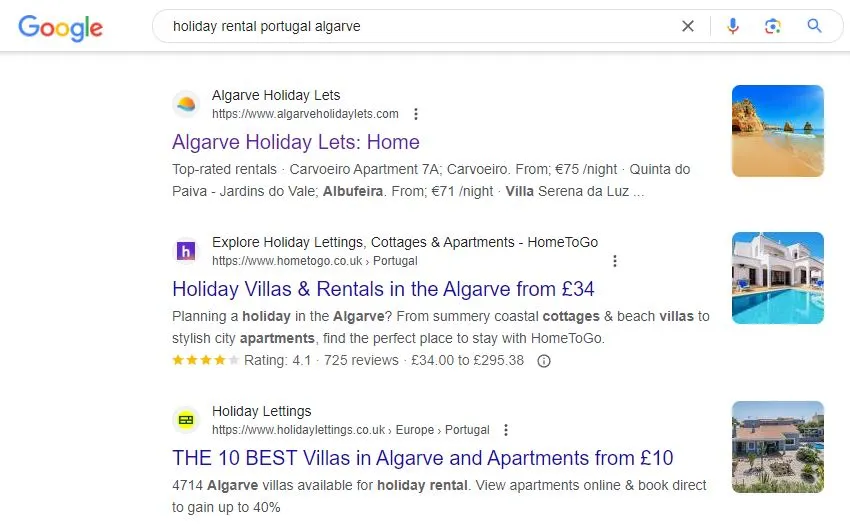
SEO is a marketing method to advertise your holiday rental online. The aim of SEO is to get your website pages ranked on the first page for specific keywords to generate traffic, enquiries, and bookings. Ideally, your target position for your web page would be in the top 3 results. Later in this article, we’ll explain why being in the top 3 is important.
Some SEO tasks can be done in the setup phase as one-off tasks, while other tasks require ongoing efforts to successfully optimise your website and its pages to appear on the first page of search engine results.
Common SEO terminology:
- Keywords: The words and phrases potential guests use when searching for holiday rentals.
- Search Engine Result Page (SERP): The page displayed by search engines in response to a query, showing the ranked list of websites relevant to the search term.
- Metadata: Information such as titles, descriptions, and tags that help search engines understand what each page is about.
- Backlinks: Links from other websites to your site, can improve your site’s authority and ranking.
- Page Speed: The speed at which your website loads for users.
- Click-Through Rate (CTR): The percentage of users who click on your link after seeing it in search results.
- Conversions: The successful completion of a desired action by a visitor, such as filling out an enquiry form or making a booking.
- Conversion Rate: The percentage of visitors who take a desired action, such as making a booking.
- Organic Traffic: Visitors who come to your website through unpaid search results.
- Analytics: Tools and data used to measure and analyse website performance.
What revenue can SEO generate for my holiday rental?
This isn’t a straightforward answer because it depends on various factors such as the type of holiday accommodation you own or manage, your goals, and the competitiveness of your target keywords. However, you can use forecasting methods to estimate potential revenue from SEO. Below are the steps for SEO forecasting:
SEO Forecasting Process:
1. Forecast Organic Traffic: Multiply the monthly keyword search volume by the average organic click-through rate. Use either current analytic data to find the average click-through-rate or find the industry standard.
2. Forecast Conversions (Leads/Bookings): Multiply the forecasted organic traffic by the average conversion rate. Use either current conversion data to find the average conversion rate or find the industry standard.
3. Forecast Bookings: Multiply the forecasted organic leads by the average lead-to-booking rate.
4. Forecast Revenue: Multiply the forecasted bookings by the average booking value.
You might have questions about how to find data like ‘keyword search volume’. Don’t worry—we provide more details on how to gather this information in this article. By following these steps, you can get a clearer picture of the potential return on investment for your SEO efforts.
Is investing in SEO the right decision for my holiday rental business?
Every holiday rental business should follow basic SEO practices for their website. These include tasks like setting relevant metadata, creating quality content, inserting appropriate keywords, optimising images, and ensuring fast page load times. Most of these can be handled during the initial setup.
However, SEO often involves ongoing efforts to improve search rankings for competitive keywords. This includes tasks like generating backlinks, analysing and responding to analytics data, content marketing, social media engagement, and participating in forums. These continuous tasks can increase costs and time investment.
Your typical goal with SEO is to generate bookings and achieve a return on your investment. If your target keyword is highly competitive, you need to assess whether the investment is worth it. Calculate your SEO forecast, consider the costs of using an agency, and decide if the potential return justifies the expense. Our SEO packages start at £400 per month for a rough gauge of agency costs.
Sometimes, the cost and competition for certain keywords make ranking impractical. We’ll help you set realistic expectations and make informed decisions about your SEO strategy.
How long does it take to start seeing results from SEO?
It’s extremely unlikely you will see instant, next-day, results from SEO efforts. It takes time to implement the necessary tasks and for them to take effect. The time it takes to see results can vary based on factors like the competitiveness of the keywords you are targeting. Generally, you can expect to start seeing noticeable results within 3 to 6 months.
For low-competition keywords, you might achieve first-page rankings within the first 3 months, leading to increased traffic, enquiries, and bookings.
It’s important to distinguish between progress and results. Progress can be seen almost immediately, such as moving from the 5th to the 4th page of search results. SEO is a journey that requires continuous effort, but the rewards are worth it in the end.
Is it important to rank on the first page of search results?
Generally speaking, yes, and here’s why. Studies analysing over one million pages and 12 million search queries have shown that only 0.63% of people click on a link from the second page. This means if 100 people search for a keyword you’re targeting and your site doesn’t appear on the first page, you’re likely to receive almost no clicks. So when people say ‘rank for a keyword’, they typically mean on the first page, as this is where you will get results.
Getting ranked on the first page is a journey, so don’t be disheartened if you’re currently on the second, third, or fourth page. With consistent effort and proper optimisation, you can improve your ranking. Later in this article, we’ll explain the key tasks you need to carry out to increase your search rankings.
Can I Compete with Bigger Competitors in Search Results?
We want to clarify there can be two ways of competing with big competitors in search engine results. Those are:
- Targeting the Same High-Competition Keywords: If you and your larger competitors are targeting the same high-competition keywords, you will likely need to invest a lot of time and money to compete with them on the first page of search results.
- Targeting Long-Tail/Low-Compeition Keywords: If you want to compete with larger competitors by promoting your holiday rental in search results without spending as much time or money, there are effective strategies you can use. One approach is to look for keywords that are still relevant to your business but have lower competition, thus requiring less time and money to rank for.
For example, imagine you own a holiday cottage in Cornwall with a hot tub. If you check the estimated difficulty for ranking for the keyword “holiday cottage cornwall,” you might find it has a score of 28 out of 100. This indicates a moderate level of competition.

This forecasted score means it isn’t the hardest keyword to rank for, and with quality content and other tasks involved in the setup phase, you should see yourself climb the rankings.
However, let’s see if we can find what is known as a ‘long-tail keyword,’ which is typically a more specific keyword with less competition. Long-tail keywords are easier to rank for in a prominent position, requiring less time and money. For instance, let’s see what the estimated ranking difficulty for” holiday cottage cornwall with hot tub” is.

There we have it. A forecasted estimated keyword difficulty of 7 or 8 out of 100, with actually more search volumes. Some simple SEO tasks can start your journey to flying up the search results to that all-important first page. By targeting these less competitive, yet highly relevant keywords, you can effectively compete with larger competitors and improve your visibility in search results.
SEO Task Categories: On-page, Off-page & Technical
If you are exploring the world of SEO, you will likely come across three main categories: On-page SEO, Off-page SEO, and Technical SEO.
On-page SEO
The goal of on-page SEO is to help search engines understand your content and determine its relevance to specific queries, leading to higher visibility and more traffic. It involves optimising your website directly, using relevant keywords, and ensuring your metadata, like titles and descriptions, accurately reflect your content.
Off-page SEO
The goal of off-page SEO is to show search engines that your site is valuable and relevant, leading to higher rankings and increased visibility. It involves actions taken outside of your website to improve its authority and trustworthiness. Common off-page SEO tasks include acquiring backlinks from reputable websites and engaging in social media marketing.
Technical SEO
The goal of technical SEO is to create a solid foundation that enhances your website’s performance and accessibility. It involves optimising your website’s infrastructure to help search engines crawl, index, and rank it more effectively. This includes improving site speed, and mobile-friendliness, and ensuring your site is secure and easy to navigate.
Development Platforms & SEO
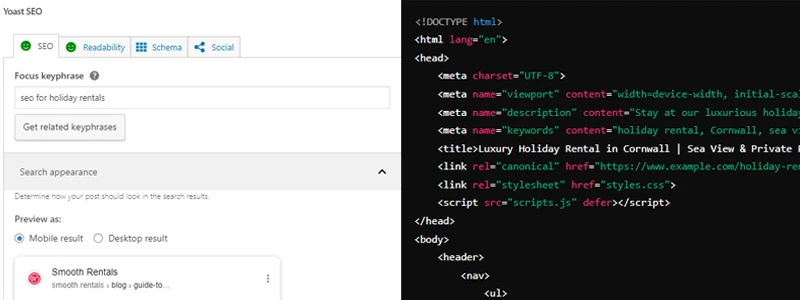
The development platform you’ve used determines how certain SEO tasks are carried out, such as metadata changes, titles, and page load times.
- Hardcoded Websites: If your website is hardcoded, manual changes will need to be made to the source code, including HTML, JavaScript, and PHP.
- Content Management Systems (CMS): If you’ve used a CMS like WordPress, there are many user-friendly plugins available to handle the required SEO tasks.
- Website Builders: Platforms like Wix, Squarespace, and Weebly offer built-in SEO tools and features. They provide a user-friendly interface, making it easy to implement basic SEO practices without technical expertise.
For many holiday rental businesses, we recommend sticking with a CMS like WordPress. The reason is simple: it allows you to easily make the necessary changes yourself without needing extensive technical knowledge. If you require further guidance on choosing a WordPress theme for your holiday rental, then check out ‘Guide: Choosing The Best Holiday Rental WordPress Theme‘.
Research your website builder
Be wary of certain website builders, especially free ones provided by property management software (PMS) companies. While these companies offer great software solutions for managing properties and guests, their free website builders often have minimal functionality, making it difficult to apply all necessary SEO tasks.
Even popular website builders like Wix can pose issues, such as creating complex site structures and providing limited access to server files required for technical SEO.
SEO Tasks For Holiday Rentals
Hopefully, you now understand more about SEO and the potential it has to benefit your holiday rental business. Next, we want to share important SEO tasks that should be carried out on your website to boost your rankings for relevant keywords.
Keyword Research
Google Ad Keyword Research Tool
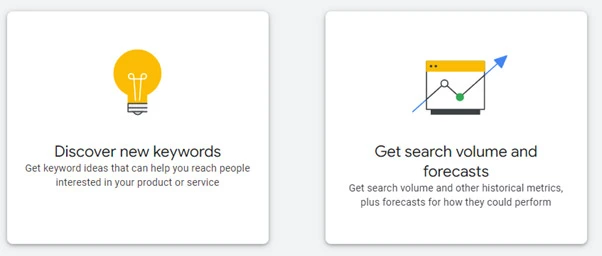
In a free Google Ad account, you can access the ‘Keyword Planner’ tool. It costs nothing and is a great place to start researching possible keywords for your website.
Simply enter, for example, a keyword like ‘holiday rental [location]’ to begin. You will then be provided a list of relevant keywords.
Discovering long-tail keywords via Google Suggest

Go to www.google.com and start typing a keyword relevant to your holiday rental, such as ‘holiday rental [location]’. Google will then begin to suggest long-tail keywords.
Discovering long-tail keywords via Google Search Results Page
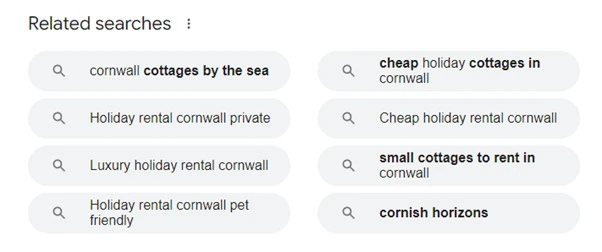
Search for a relevant keyword and scroll to the bottom of the first page of results. There, you will find additional keyword suggestions made by Google.
SE Ranking

We are going to provide a list of SEO software tools you can use for keyword research, competitor analysis, website audits, and more. For now, we recommend our favourite: SE Ranking. We’ve used all the major software providers, from SEMRush to Ahrefs, and SE Ranking is our top choice.
It offers an easy-to-use dashboard and a very helpful keyword research tool that identifies not only related keywords but also potentially relevant ones. You can also break down your searches by country to understand search query behaviour in different regions.
Answer The Public
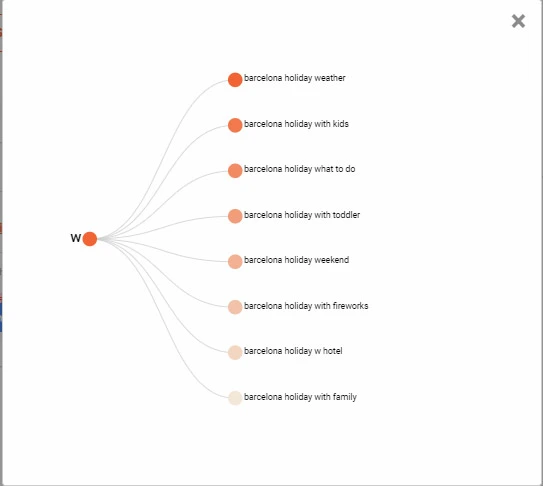
An effective tool to find questions people are asking about your holiday rental and its location can help you decide on articles or guides to write, boosting organic traffic to your website. They offer a limited number of free searches on their tool.
URL
Inset keyword into URL

By including the target keyword in your webpage’s URL, you help Google understand the page’s topic. Additionally, URLs with the target keyword are proven to receive up to 45% more clicks in search results.
Keep the URL short
The ideal URL length is less than 60 characters, making it easier for search engines to crawl and users to read. While it might not always be possible, aim to shorten your URL while maintaining readability and including the crucial keyword.
Keyword Insertion
Don’t keyword stuff
This isn’t a task to carry out, but rather a caution. Google’s search algorithms have significantly improved and can detect if you’ve randomly added keywords in your sentences. Focus on writing quality content with a natural flow that provides value to the user. The focus keyword will naturally be included throughout the article. However, many SEO experts and agencies still recommend ensuring that the focus keyword is naturally inserted within the first 150 words.
Don’t do this

Use your keywords in headings (H1, H2, H3, H4)
Naturally incorporate your target keyword and relevant terms into your headings. It’s important to include the keyword in the H1 tag, not just for search engines but also for users, so they immediately understand what the article is about.
Remember, don’t keyword stuff. If the keyword doesn’t naturally fit in the heading, don’t add it. Consider if there are synonyms available you could use.
Image Optimisation
Reduce file size
- Resize: If an image only needs a width of 500px for your website, resize it to 500px. This prevents the browser from downloading unnecessary resources, which can impact page load times.
- Reduce Quality: Lower the image quality to reduce file size while maintaining a visually appealing look. This helps decrease the payload when the browser loads the page.
- Convert to WEBP: Use online tools to convert .jpg or .png images to WEBP, the preferred image format for browsers. Simply search for ‘jpg/png to webp’ on Google.
If you wish to learn more about image optimising tools that are available, check out our article on the best image optimiser tools for improving website performance.
Add alt tag
Accessibility is a crucial aspect of user experience that Google emphasises for all webmasters. It ensures that all users, including those with disabilities, can navigate and use your website effectively. Adding an ‘alt’ tag to images helps users who rely on screen readers understand what is displayed in the image, enhancing their overall experience
Logical label
This practice should be carried out not just for SEO purposes, but also to help with organisation and prevent confusion when managing a large number of files. When managing your files, would you prefer to see an image of your holiday rental patio labeled ‘5xfs400-original-sm.jpg’ or ‘side-shot-of-patio-in-sun.jpg’? Search engines also prefer clear and descriptive labels. So, logically label all your images.
Links on website
Internal linking
This is where you link words or phrases on one page to another page on your website. The linked pages need to be relevant to the content you are linking from. This adds value to the user and provides more context to search engines crawling your page.
It also improves the crawlability of your website, allowing more pages to be indexed by Google and other search engines.
External linking
You need to consider the purpose of the page you intend to rank. If the goal is to generate bookings, be cautious with external links to third-party websites, as they can disrupt the user flow and take visitors away from your site. However, for blog articles, if you can provide a link to support your statement or offer additional information to the user, then include a link to a reputable source.
Ensure the link is configured to open in a new window.
Fix broken links
If a search engine crawls one of your pages and finds broken links (URLs that don’t exist), it can negatively impact your SEO efforts. Broken links prevent search engines from crawling all the information linked to your page and reduce the quality of your content.
Tools like SE Ranking offer an audit tool to detect broken links, which you can then manually fix.
Backlinking
- There are various methods to generate backlinks, but it’s essential to focus on creating ‘quality’ backlinks. This means avoiding spam websites and targeting sites that provide quality content and are closely related to your industry.
Best Ways to Generate Valuable Backlinks
- Quality Content: Create exclusive, valuable information that others will want to link to. This could include original data or research you have conducted.
- Promote Your Content: Share your articles on social media and reach out to companies mentioned in your content. Many will be happy to share that their business has been highlighted.
- “Keyword” + “write-for-us”: Some people are cautious about this method due to spammy websites offering this service for a fee. However, not all are like this. Search for your keyword followed by “write for us” or “blog writing” to find niche sites in your industry.
- “Keyword” + “link roundup”: This technique involves finding link roundup posts related to your industry. These posts compile valuable resources on a particular topic and can be a great way to earn backlinks if your content is included.
Content
Quality Content
“Content is king” is a well-known phrase within the SEO community, emphasising the importance of offering unique, high-quality, and valuable information to users. This approach is essential for attracting and retaining visitors, boosting search engine rankings, and establishing your authority in the industry.
Once you know the keyword you wish to rank for, research current competitors, understand what users are expecting to find entering this keyword and provide content better than anyone else online.
Readability
The majority of users scan pages, they don’t read them. Many holiday rental businesses believe it is best to provide an extensive paragraph of each of the amenities and/or facilities. Unfortunately, this can actually deter people from staying on your website.
Ensure correct formatting and structure of your content. For example, instead of writing a 200-word paragraph detailing the amenities in your holiday rental’s master bedroom, you could use four icons, each with a small title. This approach allows users to understand what is provided in the master bedroom in less than 5 seconds, compared to a minute spent reading a lengthy paragraph.
Multimedia
Closely related to ensuring correct content formatting is the use of multimedia where appropriate. Incorporating images and videos not only enhances readability and helps with rankings but also influences potential guests. According to a report from We Are Social, 37% of social media users find inspiration for their next travel destination through photos and videos.
Providing quality images and videos can improve your rankings and help potential guests visualise staying at your holiday rental.
Optimise Page Load Times
Poor page load times can negatively impact SEO by causing high bounce rates, meaning visitors leave your page immediately due to slow loading.
Google has shown through statistics that fast page load times are crucial for your holiday rental business and generating bookings.
To identify tasks to improve page load times, download Lighthouse for Chrome. This tool runs an audit on your website and provides a report with actionable steps to enhance load times.
Analytic & Google Tools To Use
Google Analytics 4
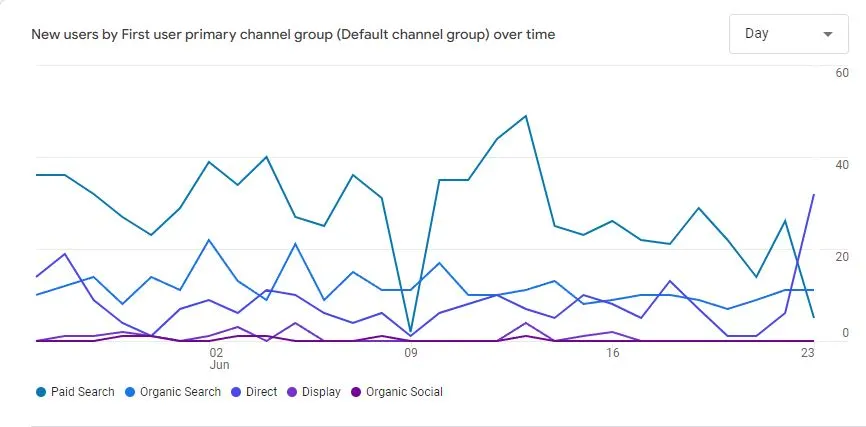
This tool helps you track and monitor traffic to your website. Discover which channels are driving your traffic, and how your pages are performing, and track user actions such as form submissions or bookings.
Reports generated by Google Analytics 4 enable your business to make informed decisions based on data, helping you allocate marketing resources more effectively.
For more information on setting it up, refer to Google’s Google Analytics 4 setup guide.
Google Tag Manager (GTM)
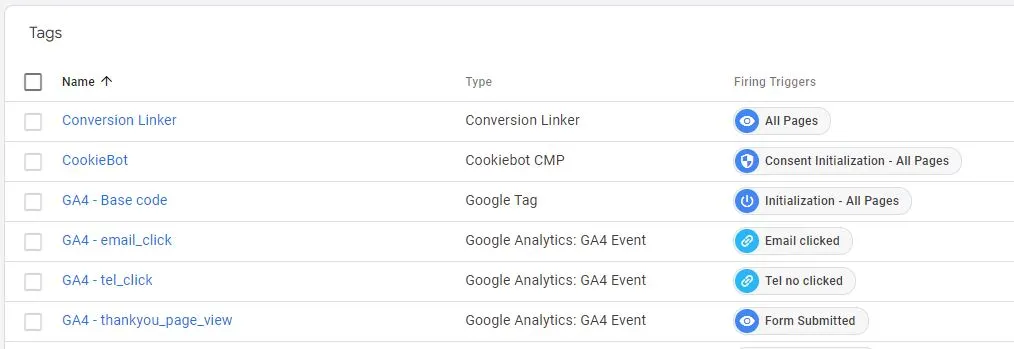
This tool isn’t for monitoring traffic or tracking search result performance, but it facilitates the installation of tags (scripts) to do so. Instead of managing tag installation across multiple platforms, you can handle it from a single dashboard, saving time and reducing confusion.
From this single platform, you can add Google Analytics 4, Google Ads, Google Search Console, and other third-party software like HotJar, which records how users interact with your pages.
We highly recommend learning and installing this tool. Check out Google’s guide on installing GTM.
Google Search Console
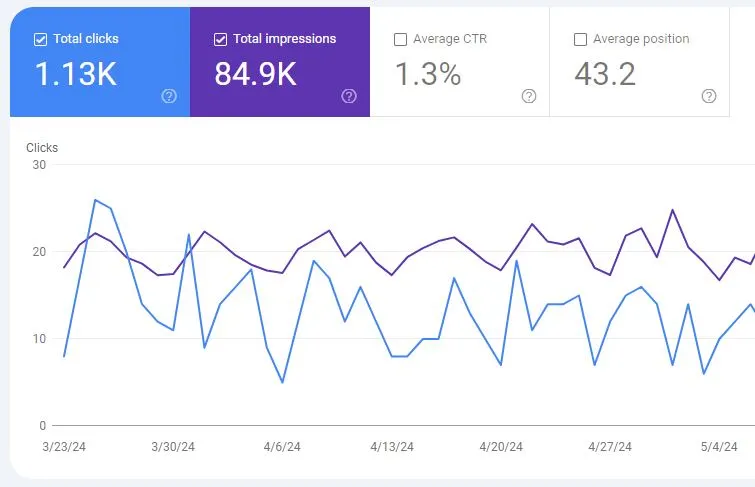
Google Search Console is a free tool that helps track your website’s organic performance. It also assists with:
- Tracking backlinks
- Submitting sitemaps
- Indexing pages
- Fixing specific website errors
- Monitoring keywords
- And more
You’ll need to install the required tag for it to start tracking data. Follow Google’s guide on how to install and verify Search Console.
Conclusion
If you have a website for your holiday rental, it is essential to follow SEO best practices.
If you’ve followed our recommendations on calculating SEO forecasts and determined there’s potential for profit and increased direct bookings, then investing the money and/or time in SEO is worthwhile.
SEO offers another channel to generate bookings and reduce dependency on third-party platforms like Booking.com, VRBO, and Airbnb.

